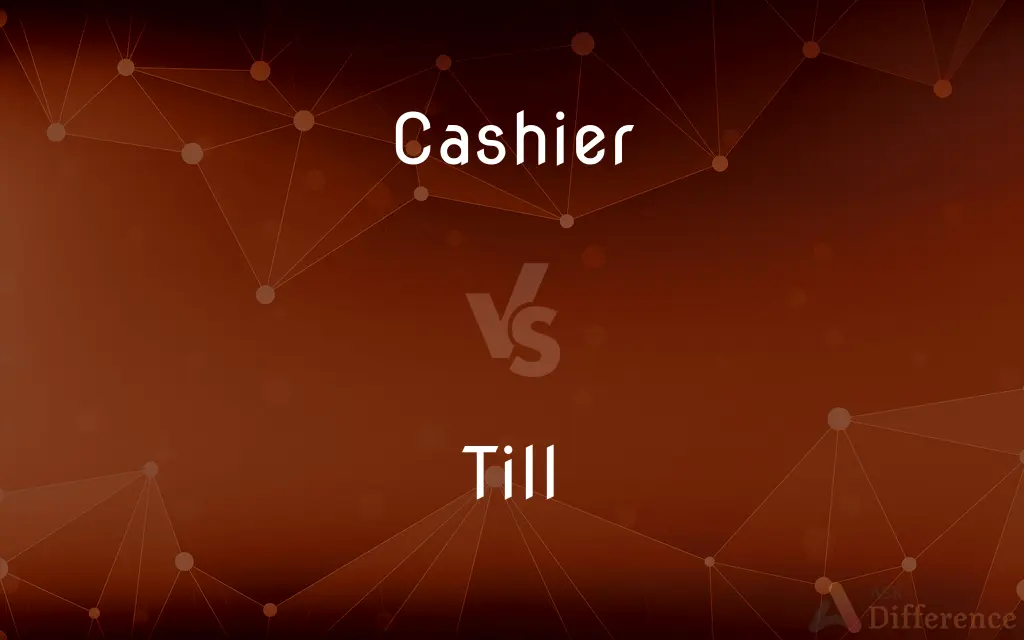Cashier vs. Till — What's the Difference?
By Urooj Arif & Fiza Rafique — Updated on March 25, 2024
A cashier is a person who handles transactions, while a till is the drawer or box where money is stored during transactions.

Difference Between Cashier and Till
Table of Contents
ADVERTISEMENT
Key Differences
A cashier is an individual responsible for managing customer transactions, handling cash, and operating registers in various retail environments. Their role involves processing sales, issuing receipts, and ensuring accurate financial exchanges. Whereas a till refers to the drawer or compartment within a cash register or point of sale system that holds money, including notes and coins, used for daily business transactions.
While the cashier's duties include greeting customers, processing payments, and sometimes managing returns or exchanges, the till's function is purely to securely store cash and change until needed for transactions. The cashier uses the till as a tool within their broader role of facilitating purchases and customer service.
Cashiers are often required to balance the till at the end of their shift, ensuring that the amount of cash inside matches the sales records. This process highlights the interaction between the cashier's responsibilities and the physical use of the till. In contrast, the till itself does not perform any actions independently but is an essential component of the cashier's workstation.
In modern retail and service industries, the term "till" can also broadly refer to the entire cash register or point of sale (POS) system, though traditionally, it specifically denotes the cash drawer. On the other hand, the role of the cashier has evolved with technology, now often involving operating complex POS systems, handling electronic payments, and sometimes managing online orders.
Training for cashiers typically covers not only the operation of the till and the POS system but also customer service skills, problem-solving, and sometimes inventory management. The till, as a piece of equipment, requires no training to use but must be maintained and secured to prevent theft.
ADVERTISEMENT
Comparison Chart
Definition
Person handling transactions
Drawer or box for storing money
Function
Manages sales, customer service
Securely stores cash
Role
Interactive, customer-facing
Non-interactive, storage
Requirements
Training in POS systems, customer service
Maintenance, security
Evolution
Has expanded with technology
Often part of a POS system
Compare with Definitions
Cashier
Financial Accuracy.
At the end of his shift, the cashier balanced the till, accounting for all transactions.
Till
Security Feature.
The till locked automatically when closed to secure the cash inside.
Cashier
Customer Service.
Cashiers often answer questions and ensure a positive shopping experience.
Till
Money Storage.
The till was organized with dividers for notes and coins for easy change making.
Cashier
Skill Development.
Training for cashiers includes customer interaction, handling payments, and problem-solving.
Till
Maintenance.
Regular cleaning and checks ensured the till operated smoothly without jamming.
Cashier
Transaction Handler.
The cashier efficiently processed payments and provided change.
Till
Transaction Record.
Each transaction was recorded, aligning with the cash amount in the till.
Cashier
Operates POS Systems.
She quickly navigated the POS system to complete the sale.
Till
Part of Cash Register.
He opened the till with a key to start the day's business.
Cashier
A retail cashier or simply a cashier is a person who handles the cash register at various locations such as the point of sale in a retail store. The most common use of the title is in the retail industry, but this job title is also used in the context of accountancy for the person responsible for receiving and disbursing money or within branch banking in the United Kingdom for the job known in the United States as a bank teller.
Till
Till or glacial till is unsorted glacial sediment. Till is derived from the erosion and entrainment of material by the moving ice of a glacier.
Cashier
The officer of a bank or business concern in charge of paying and receiving money.
Till
Less formal way of saying until
Cashier
A store employee who handles cash transactions with customers.
Till
Less formal way of saying until
Cashier
To dismiss from a position of command or responsibility, especially for disciplinary reasons
Was dishonorably cashiered from the army.
Till
A cash register or drawer for money in a shop, bank, or restaurant
There were queues at the till
Checkout tills
Cashier
To dismiss (someone, especially military personnel) from service.
Till
Boulder clay or other sediment deposited by melting glaciers or ice sheets.
Cashier
(transitive) To discard, put away.
Till
Prepare and cultivate (land) for crops
No land was being tilled or crops sown
Cashier
(transitive) To annul.
Till
To prepare (land) for the raising of crops, as by plowing and harrowing; cultivate.
Cashier
To work as a cashier (at a till or receiving payment)
Till
Until.
Cashier
One who works at a till or receives payments.
Till
Until.
Cashier
Person in charge of the cash of a business or bank.
Till
A drawer, small chest, or compartment for money, as in a store.
Cashier
One who has charge of money; a cash keeper; the officer who has charge of the payments and receipts (moneys, checks, notes), of a bank or a mercantile company.
Till
A supply of money; a purse.
Cashier
To dismiss or discard; to discharge; to dismiss with ignominy from military service or from an office or place of trust.
They have cashiered several of their followers.
He had insolence to cashier the captain of the lord lieutenant's own body guard.
Till
Glacial drift composed of an unconsolidated, heterogeneous mixture of clay, sand, pebbles, cobbles, and boulders.
Cashier
To put away or reject; to disregard.
Connections formed for interest, and endeared
By selfish views, [are] censured and cashiered.
They absolutely cashier the literal express sense of the words.
Till
Until; to, up to; as late as (a given time).
She stayed till the very end.
It's twenty till two. (1:40)
I have to work till eight o'clock tonight.
Cashier
An employee of a bank who receives and pays out money
Till
To, up to (physically).
They led him till his tent
Cashier
A person responsible for receiving payments for goods and services (as in a shop or restaurant)
Till
To, toward (in attitude).
Cashier
Discard or do away with;
Cashier the literal sense of this word
Till
(dialectal) To make it possible that.
Cashier
Discharge with dishonor, as in the army
Till
Until, until the time that.
Maybe you can, maybe you can't: you won't know till you try.
Till
A cash register.
Till
A removable box within a cash register containing the money.
Pull all the tills and lock them in the safe.
Till
The contents of a cash register, for example at the beginning or end of the day or of a cashier's shift.
My count of my till was 30 dollars short.
Till
(obsolete) A tray or drawer in a chest.
Till
Glacial drift consisting of a mixture of clay, sand, pebbles and boulders
Till
(dialect) manure or other material used to fertilize land
Till
A vetch; a tare.
Till
(transitive) To develop so as to improve or prepare for usage; to cultivate (said of knowledge, virtue, mind etc.).
Till
(transitive) To work or cultivate or plough (soil); to prepare for growing vegetation and crops.
Till
(intransitive) To cultivate soil.
Till
(obsolete) To prepare; to get.
Till
A vetch; a tare.
Till
A drawer.
Till
A deposit of clay, sand, and gravel, without lamination, formed in a glacier valley by means of the waters derived from the melting glaciers; - sometimes applied to alluvium of an upper river terrace, when not laminated, and appearing as if formed in the same manner.
Till
A kind of coarse, obdurate land.
Till
To; unto; up to; as far as; until; - now used only in respect to time, but formerly, also, of place, degree, etc., and still so used in Scotland and in parts of England and Ireland; as, I worked till four o'clock; I will wait till next week.
He . . . came till an house.
Women, up till thisCramped under worse than South-sea-isle taboo.
Similar sentiments will recur to every one familiar with his writings - all through them till the very end.
Till
As far as; up to the place or degree that; especially, up to the time that; that is, to the time specified in the sentence or clause following; until.
And said unto them, Occupy till I come.
Mediate so long till you make some act of prayer to God.
There was no outbreak till the regiment arrived.
Till
To plow and prepare for seed, and to sow, dress, raise crops from, etc., to cultivate; as, to till the earth, a field, a farm.
No field nolde [would not] tilye.
The Lord God sent him forth from the garden of Eden, to till the ground from whence he was taken.
Till
To prepare; to get.
Till
To cultivate land.
Till
Unstratified soil deposited by a glacier; consists of sand and clay and gravel and boulders mixed together
Till
A treasury for government funds
Till
A strongbox for holding cash
Till
Work land as by ploughing, harrowing, and manuring, in order to make it ready for cultivation;
Till the soil
Common Curiosities
How has technology changed the role of the cashier?
Technology has expanded the cashier's role to include operating advanced POS systems, handling electronic payments, and sometimes overseeing online order processing.
How do businesses ensure the security of the till?
Businesses use locks, keys, or electronic access controls, and sometimes surveillance, to secure the till and the cash inside.
What does "balancing the till" mean?
Balancing the till involves verifying that the amount of cash in the till matches the recorded transactions for a given period.
Is the till important for electronic transactions?
While the physical till is primarily for cash transactions, the term can also refer to the part of a POS system that records all transactions, including electronic payments.
How do cashiers contribute to customer satisfaction?
Cashiers contribute to customer satisfaction by providing efficient, friendly service, accurately handling transactions, and resolving any issues that arise during the checkout process.
What types of businesses use cashiers and tills?
Retail stores, supermarkets, restaurants, and many other customer-facing businesses use cashiers and tills for daily transactions.
What is the primary role of a cashier?
The primary role of a cashier is to handle customer transactions, including receiving payments and providing change.
What is a POS system?
A POS (Point of Sale) system is an integrated system used by businesses to complete sales transactions, manage inventory, and record customer purchases.
Can a business operate without a cashier?
Yes, some businesses operate with self-service checkouts or online payment systems, eliminating the need for a traditional cashier.
Why might a business prefer electronic payments over cash transactions?
Businesses might prefer electronic payments for efficiency, security, and ease of transaction recording and management, reducing the reliance on physical cash handling.
What skills are important for a cashier?
Important skills for a cashier include customer service, accuracy in handling money, proficiency with POS systems, and the ability to resolve problems efficiently.
What happens if a cashier's till is short?
If a cashier's till is short, it may require a review of transactions to identify discrepancies, and the cashier might need to account for the shortage.
Can anyone use the till?
While operating a till might seem straightforward, employees usually require training to handle cash accurately and use the POS system effectively.
Do cashiers need to know how to handle both cash and electronic payments?
Yes, cashiers typically need to be proficient in handling both cash transactions and processing electronic payments, including credit and debit cards.
How can the design of a till affect its use?
The design of a till, including its size, layout, and ease of access, can affect the speed and efficiency with which cashiers can complete transactions and provide change.
Share Your Discovery

Previous Comparison
Maneuverability vs. Manoeuvrability
Next Comparison
Callee vs. CallerAuthor Spotlight
Written by
Urooj ArifUrooj is a skilled content writer at Ask Difference, known for her exceptional ability to simplify complex topics into engaging and informative content. With a passion for research and a flair for clear, concise writing, she consistently delivers articles that resonate with our diverse audience.
Co-written by
Fiza RafiqueFiza Rafique is a skilled content writer at AskDifference.com, where she meticulously refines and enhances written pieces. Drawing from her vast editorial expertise, Fiza ensures clarity, accuracy, and precision in every article. Passionate about language, she continually seeks to elevate the quality of content for readers worldwide.















































